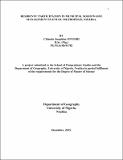Abstract:
This study was conducted in Enugu metropolis, Nigeria to investigate the spatial character of residents’ participation in the various approaches to Municipal Solid Waste management (MSWM) in the area. The study adopted survey research method. Quantitative (structured questionnaire) and qualitative (interviews and field observations) methods were employed. The researcher used simple random sampling in selecting the desired sample of 300 households for the questionnaire administration. Descriptive and inferential statistics were used in the data analysis. Data collected through questionnaire were analyzed and hypotheses tested using Chi-square. The study also used Binary Logistic Regression (BLR) to analyze the socio-demographic variables of the predictors of the extent of residents’ participation in MSWM. The result of the study shows that there is prevalence of NIMBY syndrome in the area as majority (62.0%) of the respondents have negative perception towards situation of dumpsters close to their residences. The residents’ participation in MSWM is mostly at household level. The result of the study also indicated low level of residents’ application of the Integrated Approaches namely: Reduce, Resource recovery, Reuse and Recycle (the 4Rs) as only (36.3%) apply them. There is no significant relationship between residents’ perception of MSWM responsibility and the extent of their participation. The BLR analyses revealed that the extent of residents’ participation in MSWM in the study area is selective of certain socio-demographic variables namely: Gender, education and employment status which were significant. It was concluded that residents’ participation in MSWM in Enugu metropolis is affected by factors such as: poor perception and failure of the municipality to adopt modern technology, mobilize local resources and enforce environmental laws. Thus, the study recommends public sensitization and mobilization, sorting of solid wastes at the source and provision of recycling facilities among others as keys to improved residents’ participation in MSWM.
